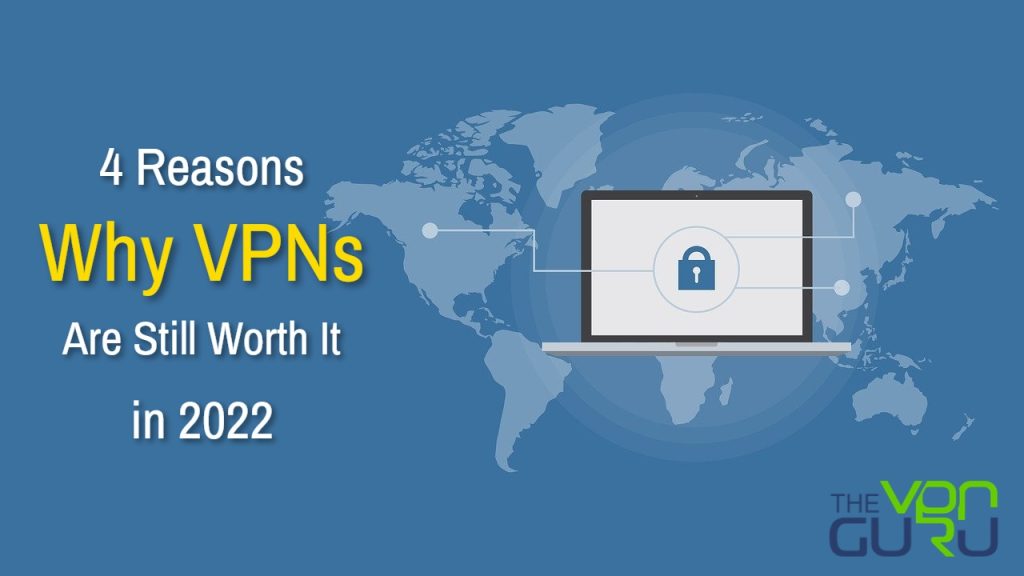4 Reasons VPNs Are Still Worth It In 2024
If you’re on the fence about getting a VPN and wondering what exactly the benefits are? This article aims to set the record straight.
It’s not going to be the mindless shill that the clickbait title suggests, but an honest, impartial look into VPNs, what they do and don’t do for your internet security, and the advantages of connecting to the internet via one today.

How a VPN Works
The easiest way to think about a VPN is similar to a mail forwarding service. When you send network packets to a website without a VPN, this communication travels straight from your internet service provider to the server that owns that site.
Your ISP can see the website that you’re accessing, and the site can see your public IP address which identifies you online.
A VPN breaks the chain between your computer and the website you’re visiting.
First, before leaving your computer, all your network packets are aggregated in the VPN client, which is software on your PC.
The client will encrypt the traffic before sending it to the VPN server. Your ISP is unable to decrypt it, and all it can find out is that it’s sending your traffic to the address of the VPN server.
Then once the traffic arrives, the server will decrypt it, read the intended destination, re-encrypt it and send it over their ISP to the site you’re trying to access.
The site can’t tell your IP address, either. All they know is that the traffic originated at the VPN server.
4 Main Reasons to Get a VPN in 2024
We summed up the four most important reasons why you should subscribe to a VPN service provider below:
1. To Watch Movies, Series, and Sports Blocked in Your Region
The world has moved forward, but our laws are stuck in the past. We can send content under the ocean in fiber optic cables. Still, restrictive broadcasting laws left over from the age of the living room television prevent the residents of one country from watching something freely available in another.
A VPN is the easiest way around this. With the click of a button, it’s possible to connect to a server in the US, UK, or Outer Mongolia. Once you’ve done that, the site will see that your traffic comes from that region. There are other ways a website can tell where you are located, but Amazon Prime, Netflix, SkySports, Hulu, and others don’t care where you watch from as long as you pay your subscription.
2. To Access Cryptocurrency Exchanges and Derivative Markets
In some regions like Turkey, Iran, the US, Vietnam, and China, crypto exchanges are either blocked or their offerings are stripped down due to local regulation.
The irony is that these laws, created to protect, have the opposite effect and force people to deal with less reputable exchanges. The United States, for example, blocks most derivative crypto financial instruments. Futures and leverage trading are practically inaccessible to US citizens. I digress.
A VPN is a way around these restrictive laws. You might need to shop around for a bit to find an exchange that will let a US citizen living abroad access these markets, but they exist, and without a VPN, there’s no chance.
3. For Protection on Sites That Don’t Use HTTPS
The majority of the internet, upwards of 70%, uses HTTPS encryption. Anytime you see a padlock in your browser, in the URL bar, it means that the site is encrypted.
There’s no security advantage to connecting to a VPN on these sites. HTTPS uses a chain of certificate authorities to ensure that the domain you are talking to is the actual site and your communication is encrypted.
However, not all of the internet is encrypted. There are still many sites that use HTTP, and on these sites, your communication and credentials are sent as clear text. If you’re accessing an HTTP site over public wifi, your traffic can be snooped on, which is a problem, especially if you reuse your passwords. When browsing sketchy sites, it’s good practice to double-wrap. A VPN is how you do that.
4. To Stop Your ISP From Throttling Your Bandwidth
ISPs are a business. They are trying to sell a product to as many people as possible while incurring as few expenses as possible. Because it’s in their best interest, some ISPs monitor traffic to detect when users are torrenting and throttle their connection to free up resources for others. You might think, well, that’s fair enough, but it isn’t. Customers should get the speed they pay for, and if the ISP doesn’t have the capacity, they need to upgrade their network. A VPN encrypts the traffic, so an ISP cannot see what type of traffic you are sending.
In Summary
VPNs can improve your online experience by unblocking overseas content, hiding what you’re doing online from your ISP, and stopping your ISP from monitoring and throating your bandwidth. If you’re still uncertain if you need a VPN or not, these reviews of Surfshark VPN will make your decision easier.





